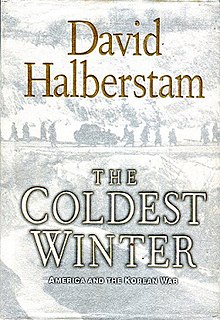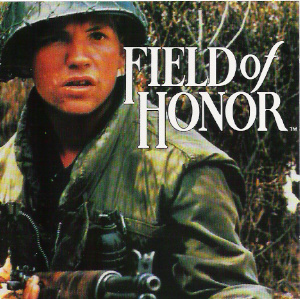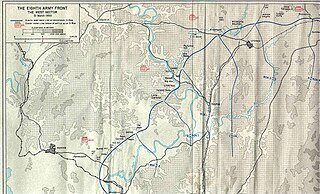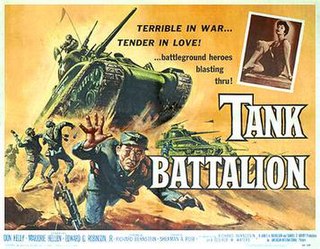 W
WThe Bamboo Prison is a 1954 American Korean War war–drama film directed by Lewis Seiler and starring Robert Francis, Brian Keith, Dianne Foster and Jerome Courtland. The working title was I Was a Prisoner in Korea. The US Army denied their co-operation with the producers.
 W
WBattle Zone is a 1952 American Korean War war film. Sequences of the film were shot at Camp Pendleton, California.
 W
WBlue is a 2003 South Korean war film directed by Lee Jung-gook focusing on elite rescue divers of the South Korea Navy. The film attracted 61,223 admissions in the nation's capital, Seoul.
 W
WThe Coldest Winter: America and the Korean War is a non-fiction book by the author David Halberstam. It was published posthumously in 2007, after his sudden death in a traffic collision at the age of 73.
 W
WThe Colombian Battalion was a Colombian Army Infantry battalion that served with the United Nations Command during the Korean War. The first Colombian military unit to serve in Asia, the Colombian Battalion was attached to the US 7th Infantry Division and 25th Infantry Divisions during the war. The battalion was deployed from 1951 to 1954.
 W
WDandong Langtou Airport is an airport serving the city of Dandong, Liaoning, China.
 W
WF-15 Strike Eagle III is an F-15 Strike Eagle combat flight simulator released in 1992 by MicroProse and is the sequel of F-15 Strike Eagle and F-15 Strike Eagle II. It is the final game in the series.
 W
WField of Honor is a 1986 Dutch/South Korean war film set during the Korean war, directed by Kim Dae-hie and Hans Scheepmaker.
 W
WThe First Battle of Seoul was the North Korean capture of the South Korean capital, Seoul at the start of the Korean War.
 W
WFive Marines is a 1961 South Korean film. It was popular genre-film director Kim Ki-duk's directorial debut.
 W
WThe Frozen Hours is a novel about the Korean War, which tells the dramatic story of the Americans and the Chinese who squared off in one of the deadliest campaigns in the annals of combat: the Battle of Chosin Reservoir, also known as Frozen Chosin.
 W
WGoing All the Way is a 1997 American comedy-drama film directed by Mark Pellington, in his feature film directorial debut. The film was written by Dan Wakefield, based on his 1970 novel and starred Jeremy Davies, Ben Affleck, Rachel Weisz, Amy Locane and Rose McGowan. The film was shot on location in Indianapolis, IN, the setting of Wakefield's autobiographical novel.
 W
WHaeju Airport is an airport located in Haeju, South Hwanghae, North Korea. Haeju Airport is controlled by the Korean People's Army. The airport mainly operates military flights but also has a limited number of civilian flights. This airport is notorious to South Korean intelligence authorities, because former North Korean Intelligence agents frequently use it as a transfer point. The single runway 12/30 is 6562x289 ft.
 W
WThe III Corps was a corps of the Republic of Korea Army that was formed on October 16, 1950. It was Command by Major General Yu Jae Hung.
 W
WThe Jamestown Line was a series of defensive positions occupied by United Nations forces in the Korean War. Following the end of the 1951 Chinese Spring Offensive and the UN May-June 1951 counteroffensive the war largely became one of attrition and trench warfare, fought along static defensive lines reminiscent of the First World War. As a consequence major UN ground operations from late spring—under the direction of Lieutenant General Matthew Ridgway—were primarily conducted to recapture or establish durable defensive lines, including the Wyoming, Missouri, Kansas and Jamestown Lines. The Jamestown Line stretched from the Imjin River near Munsan-ni then arched northeast 35 miles (56 km) in the strategically important sector of front from the Kimpo peninsula on the Yellow Sea coast to a point east of Kumhwa.
 W
WJapanese War Bride is a 1952 drama film directed by King Vidor. The film featured the American debut of Shirley Yamaguchi in the title role. In February 2020, the film was shown at the 70th Berlin International Film Festival, as part of a retrospective dedicated to King Vidor's career.
 W
WJinhae Air Base also known as Chinhae Air Base is a naval airfield of the Republic of Korea Navy in Jinhae, South Korea.
 W
WKorea Patrol is a 1951 war film released by Eagle-Lion Films. Together with Sam Fuller’s The Steel Helmet and Sam Katzman’s A Yank in Korea, it was one of the first Hollywood films exploiting the Korean War.
 W
WThe Korean Airlift was a military operation during the Korean War by the United States Air Force and other air forces participating in the United Nations action. Begun in 1950 under the command of Major General William H. Tunner, it provided air support to the air war in Korea.
 W
WThe Last Witness is a 2001 South Korean thriller film directed by Bae Chang-ho and starring Lee Jung-jae, Ahn Sung-ki and Lee Mi-yeon. It is based on the novel of the same name by Kim Seong-jong, and is the second adaptation of the book, the first being in 1980.
 W
WThe Long Way Home is a 2015 South Korean film written and directed by Cheon Sung-il, about the friendship between a South Korean and a North Korean soldier during the Korean War.
 W
WThe Marines Who Never Returned is a 1963 South Korean film directed by Lee Man-hee. It was released in the U.S. in 1966 as Marine Battleground. For this film, Lee was given the Best Director award at the third Grand Bell Awards ceremony in 1964. The film was also given the awards for Best Sound and Best Cinematography.
 W
WMarines, Let's Go is a 1961 CinemaScope DeLuxe Color Korean War film about three Marine buddies on shore leave in Japan and at war in Korea. It was produced and directed by Raoul Walsh, who also wrote the story. Walsh had previously had successes with films about the U.S. Marine Corps in World War I, the 1920s, and World War II. This was the next-to-last film of Walsh's long directing career.
 W
WNambugun: North Korean Partisan in South Korea is a 1990 South Korean war drama film directed by Chung Ji-young. It is based upon the experiences of Lee Tae, a war correspondent and Partisan during the Korean War.
 W
WThe Nun and the Sergeant is a 1962 Korean War drama starring Anna Sten and Robert Webber in the title roles. It was produced by Sten's husband Eugene Frenke, who had produced the 1957 film Heaven Knows, Mr Allison, also a pairing of a Catholic nun and a U.S. Marine. It was directed by Franklin Adreon and released through United Artists.
 W
WOperation Dames is a 1959 film set in the Korean War. American International Pictures released the film as a double feature with Tank Commandos. The film starred Eve Meyer. It was retitled Girls in Action in the Commonwealth countries, possibly to avoid a connection between the title dame.
 W
WOrang Airport is a small airport located approximately 40 kilometres from Chongjin, North Hamgyong in North Korea. Built by the Imperial Japanese Army, designated as K-33 by the USAF during the Korean War, Orang Airport is now controlled by the Korean People's Army. Hoemun Airfield was renamed when the original Chongin Airfield K-34 was abandoned after the Korean War. The airport is normally used by the military, though a small number of commercial passenger flights also operate there.
 W
WPiagol (Korean: 피아골) is a 1955 South Korean film directed by Lee Kang-cheon. A controversial film about the Korean War, it was banned due to its supposedly "pro-communist" content, but the director launched a protest to have the film re-released.
 W
WThe Punchbowl was the name given to the bowl-shaped Haean Basin (해안분지) in Yanggu County, Gangwon Province by UN Forces during the Korean War. The Punchbowl lies several km south of the Korean Demilitarized Zone.
 W
WSergeant Ryker is a 1968 drama–war film directed by Buzz Kulik and starring Lee Marvin and Bradford Dillman. The film was originally broadcast on television as "The Case Against Paul Ryker", a 1963 two-part episode of Kraft Suspense Theatre. It was released as a feature film in 1968 to capitalise on Marvin's popularity from The Dirty Dozen. Its second run paired it as a double feature with Counterpoint.
 W
WShangganling is a 1956 Chinese war film, also translated as Battle of Shangganling and Battle on Shangganling Mountain. It depicts the Battle of Triangle Hill during the Korean War, an especially bloody battle that resulted in eventual Chinese victory.
 W
WSilver Stallion is a 1991 South Korean film based on the novel by Ahn Jung-hyo.
 W
WSokcho Air Base is an air base in Sokcho, a city in the Gangwon province of South Korea.
 W
WSondok Airport is an airport in Sŏndŏng-ni, Chŏngp'yŏng-gun, Hamgyong-namdo, North Korea.
 W
WTank Battalion is a 1958 war film directed by Sherman A. Rose and starring Don Kelly, Leslie Parrish and Edward G. Robinson Jr. Four men in their tank, during the Korean War in 1951, find themselves behind enemy lines. American International Pictures originally released the film as a double feature with Hell Squad.
 W
WUnited Nations Security Council Resolution 83, adopted on June 27, 1950, determined that the attack on the Republic of Korea by forces from North Korea constituted a breach of the peace. The Council called for an immediate cessation of hostilities and for the authorities in North Korea to withdraw their armed forces to the 38th parallel. They also noted the report by the United Nations Commission on Korea that stated North Korea's failure to comply with Security Council Resolution 82 and that urgent military measures were required to restore international peace and security.
 W
WUnited Nations Security Council Resolution 90 adopted unanimously on January 31, 1951, resolved to remove the item "Complaint of aggression upon the Republic of Korea" from the list of matters of which the council is seized.
 W
WThe Vicar of Christ is a bestselling 1979 novel by Walter F. Murphy. The novel tells the life story of the fictional Declan Walsh, who at various stages of his life is a Medal of Honor recipient for actions during the Korean War, Chief Justice of the United States, and finally Pope Francis I.
 W
WOn October 15, 1950, U.S. President Harry S. Truman and General Douglas MacArthur met on Wake Island to confer about the progress of the Korean War. Truman decided he would meet MacArthur at Wake Island, "so that General MacArthur would not have to be away from the troops in the field for long."
 W
WWar is Hell is a 1961 American war film written, produced and directed by Burt Topper. The film stars Baynes Barron and Michael Bell and is narrated by Audie Murphy. A featured cast member is Judy Dan.
 W
WYeouido Airport was an international airport in Yeouido, Seoul, South Korea. It operated as an international airport from 1929 to 1958, and thereafter as a military base until 1971.